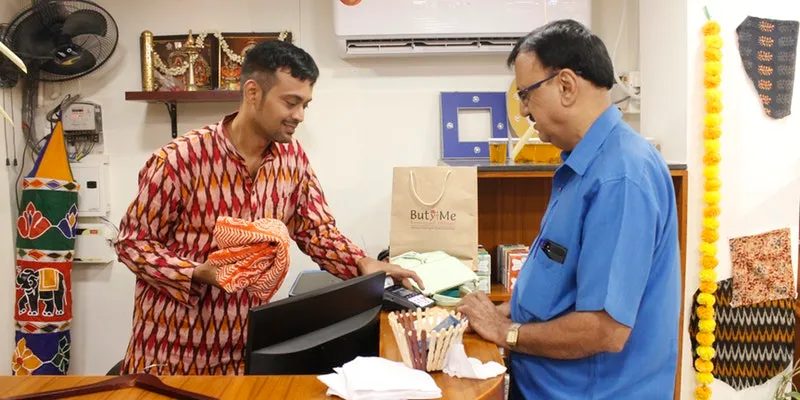Bootstrapped with founders’ PF money, this wellness brand now clocks Rs 32 lakh revenue
Bengaluru-based Butyfulme sources all its raw materials from rural communities thus increasing their economic opportunities and reducing urban dependence.
Ramya Padmanabhan depended on Mallikarjun, an autorickshaw driver, for her daily commute. An interaction with him two years ago got Ramya, 39, thinking. Mallikarjun was restless for not being able to pay his rent. On being asked why he did not return to his village, he said that despite having two looms back at home, there was not much demand for handloom apparel.
Additionally, the government agencies that supplied threads to his family did not pay much.
“Traditionally a weaver from a small village in Karnataka, Mallikarjun came to Bengaluru to drive an auto and make his ends meet,” Ramya tells SMBStory.
Similarly, Ramya came across Hari, a master weaver from Ambasamudram, who now works in a transport company in Chennai, due to the unavailability of threads. “Someone who offered us natural products in the past, were now wearing our old T-shirts and jeans,” she says.
Soon, in July 2018, Ramya got in touch with her former colleague, Srinath Parthasarathy, 38, who was then working with PayPal in the US. “Both of us related to natural products and we discussed how it was time that we made natural products available on the shelves. Being in the US, Srinath was surrounded by packaged, synthetic products,” Ramya says.
Once Srinath returned to India, the duo started Butyfulme (read as ‘Beautiful Me’), in September 2018. Headquartered in Bengaluru, Butyfulme is a wellness and lifestyle company, offering sustainable clothing, personal care, home essentials, and kitchen-ware products. The company sells its products through its online website and has two brick-and-motor stores, one in Bengaluru, and the other in Chennai.

Ramya Padmanabhan, Co-founder of Butyfulme
The team
Ramya is an MBA from Symbiosis Centre for Distance Learning. She has earlier worked as a Product Manager at HCL Technologies and as the Vice President of Innovations at HSBC Electronic Processing, India.
Srinath did his MBA from the University of Madras and has worked with Tata Consultancy Services in the past. He was the Manager of Software Development at PayPal, before taking the entrepreneurial plunge. The duo had worked together at a fintech company, Altimetrik.
Ramya and Srinath bootstrapped their company with Rs 20 lakh from their PF amount which they had been saving for over 15 years.
“Hearing more about broken young adults, seeing children with allergies and deadly cancers, and viruses growing stronger by the day made us realise that we have to go back to using natural products,” Ramya says. Interestingly, the duo misspelt the name of the company intentionally. “However misspelt, you are beautiful,” she says.
Butyfulme also works with freelancers from National Institute of Fashion and Technology. Everything else, including marketing, is outsourced.
It has Ravi Garkipatti (former CTO of ), Abhijeeth Naik (former CFO of .com), Yathindra L (Professor at NIFT Bangalore), Karthik Natarajan (former CFO of Vishal Mega Mart), and Alok Subudhi (Founder of Nhance Now), on its advisory board.
One-stop shop
Indian fabrics and personal care products, which are usually made using traditional methods, inherently promote sustainability and offer well-being. However, often these products miss out to catch up with the latest fashion trends. This gap thus increases the consumption of fast fashion, impacting the supply-chain negatively.
This is where Butyfulme comes in. Hundred percent of its raw materials are sourced from rural communities thus increasing their economic opportunities and reducing urbanisation. Additionally, all the handloom and handprint products are sourced from weavers and hand-printers from across the country, creating stable job opportunities for these craftsmen.
Finally, “Fast fashion being the second largest polluter, our offerings contribute towards reducing the negative impact on the environment,” Ramya says.

Srinath Parthasarathy (Left), Co-founder of Butyfulme at the store
How does it work?
Currently, Butyfulme has a private clothing label called WearWell. For that, it sources its fabrics from individual craftsmen and NGOs that support crafts and natural processing, from across the country. To name a few, it sources Khamir from Kutch, Charaka from Sagar, and from communities like Katri and Chippa. The designing is done in-house, and tailoring is outsourced to empanelled units.
“We are currently working to reverse-migrate a few Bengali tailor families back to their homes, from Bengaluru,” says Ramya.
Additionally, Butyfulme procures fabrics, and colours and dyes from specific regions in the country. “Our idea is to have a minimal team size in the urban areas and fully operate from the rural regions,” she adds.
Its other three labels are - LiveWell (bath and body products), EatWell (kitchen-ware), and FeelWell (wellness guidance, offered as a value-added service). Butyfulme targets individuals who make a choice to lead a wellness-oriented lifestyle using sustainable apparel and products. Interestingly, “It also attracts customers who are not conscious sustainable buyers but go for the aesthetics the brand offers,” Ramya says.
Growing numbers
According to an India Brand Equity Foundation (IBEF) report, the Indian handicraft sector generates huge employment opportunities in India. In fact, India exported handicrafts worth $2.42 billion between April and November in 2018. Established players like FabIndia and startups like , Good Earth, , and Nakhrewaali, are all working towards expanding the footprint of Indian handicrafts on the world map. Butyfulme thus has a large market to cater to.
It started its online store and brick-and-mortar store in Bengaluru in September 2018. Following its success, it organised pop-ups in Chennai. By April 2019, it started another store in Chennai. So far, through its website and two stores, Butyfulme has reached over 2,000 customers, and has clocked a revenue of Rs 32 lakh, with almost no marketing spend.
Going ahead, Butyfulme plans to scale up its online channel, and the two stores, further. By 2022, it wants to expand its other labels and launch their private products under categories LiveWell, EatWell, and FeelWell. According to the founders, Butyfulme is targeting 25,000 daily hits on its website, in the next two years.
(Edited by Javed Gaihlot)










